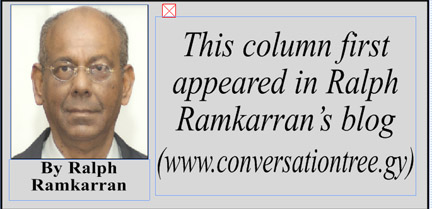Georgetown is already a disaster. An explosion of disease is all that remains to condemn the city as unsafe for human habitation. The spectacle of Georgetown and its environs under water was not unusual but the mixture of water with muck and floating garbage from clogged drains could only be described as gross. Even though the government has taken control of the city’s administration, the interminable blame game continues, while the city gets worse every year, just when we felt that it was so bad it could not.
Yet we were recently regaled by Dr Bharrat Jagdeo, a Champion of the Earth, not bothered about clogged drains. The daily column in the Guyana Times, ‘Eyewitness’, nowadays reflects his views in uncannily familiar language, close to his own. It regularly takes issue with anyone, including me, who may have ignited, or could potentially ignite, the great man’s infamously short fuse in puerile analyses and ‘pathetic’ (Eyewitness’s word) conclusions, but has not pontificated on the relationship between clogged drains and flooding in the city.
The symbol of the city’s collapse is the dilapidated state of City Hall. It is a heritage building designed by Fr Ignatius Scoles and constructed in 1889. The public does not know when it would become unsalvageable but it cannot be too long from now.

We observe in dismay and horror, the tragic funeral rites of City Hall and our once beloved city being performed before our very eyes.
The disasters of flooding and garbage and the new concrete and glass monstrosities, complained about by Rupert Roopnaraine, have all but transformed the appearance of the city from its genteel Dutch and British heritage of tree-lined canals, pebbled avenues and Demerara shutters to a raucous mishmash of office blocks, minibuses, fast-food joints, beer gardens, nightclubs and haberdashery enclaves.
The old city had of necessity to accommodate changes and development. Sacrifices had to be made. But some of its charms, ambience and rich culture could have been preserved.
After the government changed in 1992, by popular consensus an Interim Management Committee replaced the then city council. There was a surge of optimism.
Much good work was done, the decline was briefly halted and plans laid for the continuation of the efforts after elections which took place in 1994. Unfortunately the decline was only briefly interrupted and resumed with more intensity.
The failure to hold timely elections probably contributed substantially to the stalemate but it cannot be ruled out that, as in the national political configuration, that between the government and the city council which started since 1994 has much to do with the current state of affairs.
In the face of a complete breakdown in relations between the government and City Hall, the government appointed a Town Clerk in whom it had confidence. Having taken control of the administration, the government was expected to have taken responsibility for solving the city’s problems. But instead of progress, this only exacerbated the confusion leading to mutual hostility bordering on internecine warfare.
Even with the government’s own sympathetic officials in place, the city continues its rapid descent. Some weeks ago the garbage crisis grew close to a medical crisis after some garbage collectors were dismissed without an alternative plan to collect the garbage.
The spectacle of homes and streets being inundated by a garbage and sewage-laden miasma through which residents and pedestrians have to dwell and meander to their places of work and study, is most painful to behold. The city’s residents, visitors and occupants by day do not deserve this. Our great historic treasure, Georgetown, with its now dwindling beauty, riches and memories, does not deserve to have to struggle to escape being crushed by the engulfing tentacles of a flooding and filthy concrete jungle, clogged drains and putrefying rubbish on its streets.
There appears to have been no preparation for the rainy season even though, in response to David Granger’s call for the appointment of a Ministerial Task Force, the government announced that such a body already exists. What has this task force been doing? Can it give Georgetown an explanation as to why the usual clearing of canals, trenches and drains around the city and its environs just before or at the beginning of the rainy season did not take place? Does this task force not believe that it owes Georgetown an explanation as to why an emergency plan for the flooding last week is not in place? What about the Town Clerk who appears now to be in full control? Where are those in authority? The contempt for Georgetown is astonishing.






